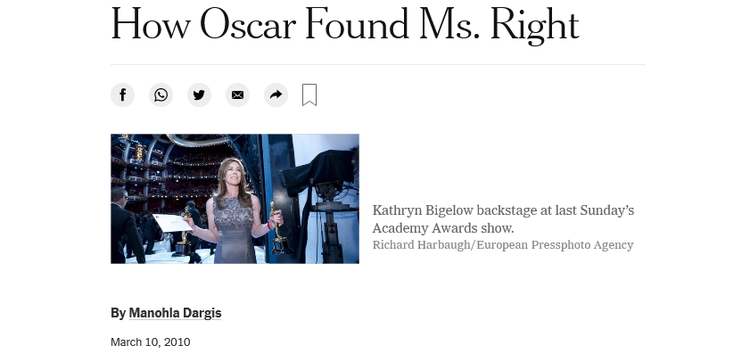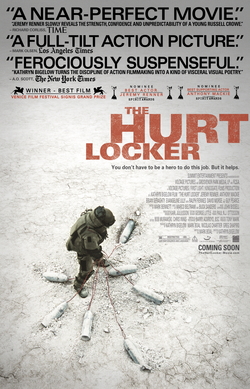
Women and the Academy Awards
03/15/2010

In the NY Times, film critic Manohla Dargis is all worked up over Kathryn Bigelow becoming the first women to win the Best Director Oscar: a triumph for feminism!
Dargis is smart enough that she seems vaguely uneasy over the fact that it’s a little more complicated than that. (For example, women are on-screen for no more than 2 minutes in "The Hurt Locker.")
The dirty little secret that Dargis can’t quite bring herself to mention is that the triumph of her kind of auteur-worshiping film theory that lionizes titans like Orson Welles has lessened appreciation of women as directors, few of whom have the requisite ambitiousness.
For example, the 1988 comedy "Big" was, in retrospect, the first of a long run of good movies starring Tom Hanks, but few could see Penny Marshall (Laverne on Laverne and Shirley) as a Best Director for "Big." On the other hand, if you conceive the role of the film director as less a Beethoven-like giant of self-expression molding his profound artistic statement and more as a presiding coordinator who keeps everybody moving together in the right direction, well, then, sure, Penny Marshall did a bang-up job on "Big."
But there are lots of other demographic oddities when you look through the history of the Oscars. I've pointed out before that no woman has ever been nominated for Best Cinematography. (One reason is that it’s very hard for a woman to serve as an apprentice in that craft because the entry-level job is lugging heavy lights up ladders, so upper body strength is a requirement).
Another disparity I've just noticed is the lack of women nominees for Best Score (background music, not songs). Rachel Portman was nominated three times between 1996 and 2000, and in 1996 became the first woman to win. Before her, no woman had been nominated since Ann Ronell in 1945 (at least that’s my guess based on first names).
And no woman has been nominated since 2000, so that’s 45 men out of the last 45 nominees.
Granted, Best Score is one of those awards where you aren’t really certain if the person nominated did the actual work. Randy Newman’s uncle Alfred Newman received 45 nominations because he was the head of the music department at his studio and insisted that he get sole credit for all the work done by his staff. And, it’s a small and nepotistic business: six Newmans have been nominated. (All male, by the way.)
So, it could well be that an anonymous female staffer actually wrote the music for one or more of the last 45 films nominated for Best Score. The Writer’s Guild offers a credit dispute resolution system for ensuring that screenplay nominations go to the people who wrote the largest parts of the script, but I don’t believe anything like that exists for scores.
Still, it’s a remarkable disparity between the sexes.
Orchestral composition is one of those skills that are so far beyond my talent range that I really have no concept of what is involved, and why men so outnumber women at it. Two centuries ago, from Beethoven onward, composing for orchestra was perhaps the single most lionized of all artistic trades, so it’s not surprising that the mystique surrounding it would attract the most ambitious of artists, such as Wagner, and that it would remain an all-male domain.
Yet over the last half century, however, it’s dropped off to a niche field. Moreover, film scoring itself isn’t on the cutting edge of musical art. It’s more of a nice-paying job for musicians who are very highly skilled but lacking in the Beethoven-like ambition to assault Olympus, and instead are willing to subordinate their egos to help punch up the emotional impact of the scene where Jennifer Aniston realizes how much Owen Wilson’s dog means to him.
So, the sex disparity in Best Score nominations presumably reflects actual disparities in compositional talent at the far right edge of the musical bell curve.
